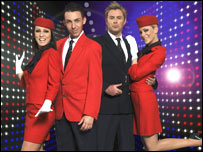
|

Scooch from the UK received a dismal score and were nearly last
|
This year’s Eurovision Song Contest has been won by a singer from Serbia with a powerful ballad about an estranged lover. But it was a disappointing night for the UK, whose team tied with France in joint second-last place.
The Eurovision Song Contest is an annual competition between more than 40 European countries, which is broadcast live on television throughout Europe and the rest of the world.
Each participating country sends one musical act to the competition to sing a song. Once all the acts have performed, each country awards points to the singers they liked best – these points are usually based on phone and text message votes sent in by viewers in the various countries.
However, the contest has faced mounting criticism in recent years as countries have tended to vote for their neighbours and "friends" rather than judging each entrant on their merits.
This process, known as "block voting", often sees Scandinavian, Baltic and Balkan countries voting for each other while other countries receive few votes or even no points at all – the dreaded "nul points".
But some commentators say the competition should not be taken too seriously and that national partisanship is all part of the fun.
Whatever the result, the Eurovision Song Contest is always a spectacle featuring camp acts, baffling lyrics and incomprehensible titles such as "Diggi-Loo Diggi-Ley" and "Ding-A-Dong".
The competition has acted as the springboard for a few successful musical careers and many failed ones.
Eurovision winners who have gone on to superstardom include Abba, who won the competition in 1974 with the hit song "Waterloo", and Celine Dion, who won the competition in 1988 representing Switzerland despite being a French–Canadian.
|